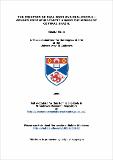The creation of real food and real people : gender complementarity among the Menku of Central Brazil
Abstract
The thesis aims to provide a first ethnographic description of the Menkü of Central Brazil by focussing on their non-hierarchical gender-complementarity as it realises itself in relationships of production and reproduction. The first part of the thesis comprises of an introduction to the group from a historical point of view by providing a description of the Menkü's historical experiences during this century. This is followed by a description of the settlement, and the social spaces it encompasses. The second part focusses on the creation of real food by firstly elaborating social and physical aspects of material production. Secondly, it explores the
metaphysical aspects of production and reproduction by uncovering the relationships human beings engage in with the world of masters of the elements, animals and ancestors. The third part of the thesis investigates processes underlying the creation of real people by focussing on
Menkü life cycle, kinship and social organisation. A person's life is depicted in the way
it is geared towards the acquisition of gendered skills of production and reproduction, which are fully manifested by the married couple. An outline of the Menkü system of classificatory marriage reveals the stress on the married couple from another point of view. It will be shown that the ideal marriage partners are identified by a conflation of gender and affinity. The last chapter explores the generation of sociality as it reveals itself in happiness, abundance and togetherness. It shows the extent to which a high communal morale is preconditioned upon non-hierarchical gender-relationships.
Type
Thesis, PhD Doctor of Philosophy
Collections
Items in the St Andrews Research Repository are protected by copyright, with all rights reserved, unless otherwise indicated.

